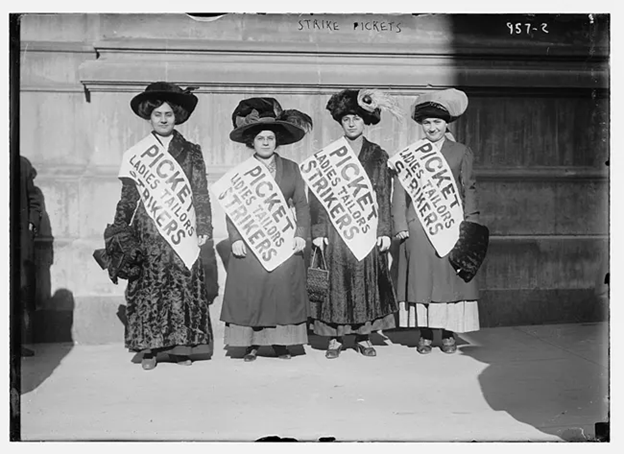How Jewish Americans Have Led the Way in Labor Organizing

Credit: Library of Congress
May is Jewish American Heritage Month, and as a Jewish woman, I’ve always been inspired by our history. I’m proud to celebrate the powerful work we’ve done to promote a more equitable world – especially within the labor movement. From historical figures like Rose Schneiderman and David Dubinsky to modern-day leaders like Lynne Fox, Randi Weingarten and Stuart Appelbaum, America’s labor history is rich with leaders that have organized and expanded worker’s rights.
It is also personal to me. Two of my Great Grandfathers immigrated from Russia and as they went through the struggles and hardships to make a life in New York, they were a part of labor actions in the early 1900s. They found work as garment workers and participated with the Jewish community in trying to create better safe and more stable jobs. It was not easy and they ultimately went to other parts of the country to find better working and living conditions, while continuing to participate in labor actions. This history is among one of the reasons that my Jewish family, from both my mother and father, have long been pro-union and have lived the benefit of the labor movement.
One of the most well-known actions was the Uprising of 20,000. In November 1909, more than 20,000 mostly Jewish women garment workers organized a strike that lasted for 11 weeks. Women organizers from the International Ladies Garment Worker’s Union (ILGWU) partnered with the New York Women’s Trade Union League and the strike is said to have “sparked five years of revolt that transformed the garment industry into one of the best-organized trades in the United States.”
Strikers demanded better pay and working conditions, particularly for the women in the garment industry who suffered gender discrimination and harassment in the workplace. One of the organizers of the strike was Clara Lemlich Shavelson, who continued to fight for labor and voting rights for women, believing that women’s voices should be heard at work and in the political world. She was a lifelong organizer – even convincing the nurses in her retirement home to organize. Another one of the strike organizers, Pauline Newman, became the first female Jewish American general organizer for the International Ladies Garment Worker’s Union (ILGWU).
Many employers eventually settled with the unions, but the notoriously anti-union Triangle Shirtwaist Co. chose to dismiss most of their union workers rather than negotiate. Just over a year later, 146 workers died in the infamous fire. The Jewish community, along with unions and social activists, quickly organized a relief fund to support the families of the Triangle Shirtwaist Factory fire victims. They also demanded health and safety regulations to prevent future tragedies.
Rose Schneiderman, a prominent Jewish American labor leader, helped organize a march to mourn the victims of the fire and bring more attention to the terrible working conditions that remained in place. More than 500,000 mourners attended. Ongoing pressure from the Jewish community, organizers, and labor advocates eventually led to the creation of the New York State Committee on Safety, which included future Secretary of Labor, Frances Perkins.
Another leader whose work is intertwined with the ILGWU was David Dubinsky. Born abroad in Brest-Litovsk (then part of Russian Poland), he was elected secretary of his local of the bakers’ union at the age of 15. After being imprisoned as a political dissident, he immigrated to America in 1911 and began working as a dress cutter. He quickly became involved in his local union, going on to lead the ILGWU, help establish the Committee for Industrial Organization (CIO) and develop a code of ethics that was adopted by the labor movement.
The common thread in these stories is the pursuit of justice and a better life for America’s workers, and the legacy of these Jewish American labor leaders continues today. Learn more about the present and future of organizing at dol.gov/WORKcenter.
Allison Zelman is the chief of staff at the U.S. Department of Labor.
Misra.Aishwary…
Wed, 05/24/2023 – 13:10


Comments are closed.